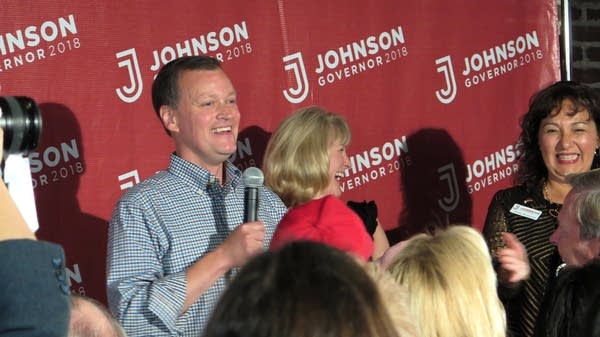Walz and Johnson win Minnesota governor primary, will face off in November

Go Deeper.
Create an account or log in to save stories.
Like this?
Thanks for liking this story! We have added it to a list of your favorite stories.
In the most-watched Minnesota primary race Tuesday evening, Tim Walz, a congressman from Minnesota's 1st District, beat two other challengers in the DFL primary election for governor, while Jeff Johnson, the Republican-endorsed candidate for governor, pulled out a surprise upset over former two-term Gov. Tim Pawlenty.
Walz managed to beat two other challengers, state Rep. Erin Murphy, the DFL-endorsed candidate, and Attorney General Lori Swanson.
Walz said he was humbled by the win and thanked his supporters.

"We believe in a state where we can come together around our shared values to address our diverse needs,'' he said. "We believe in One Minnesota. And tonight's victory shows that hundreds of thousands of Minnesotans do too."
Turn Up Your Support
MPR News helps you turn down the noise and build shared understanding. Turn up your support for this public resource and keep trusted journalism accessible to all.
Johnson maintained a steady lead over Pawlenty all evening and called state government "arrogant and broken."
"We will change the culture in St.Paul from that of controlling and directing Minnesotans to actually serving the people who pay our salaries,'' he said. "Minnesotans will have more money in their pockets, and less government bureaucracy in their lives.
Walz captured 42 percent of the votes, Murphy got 32 percent and Swanson grabbed nearly 24 percent.

In the Republican primary, Johnson pulled ahead with 52.5 percent of the vote; with Pawlenty realizing nearly 44 percent.
Pawlenty conceded the race shortly after 10 p.m.
"This is the era of Trump and I don't fit into that very well,'' Pawlenty said after his concession. "We knew the ground had shifted, but I think we thought there was still a reservoir of support from Pawlenty supporters we could draw upon to win this thing. But that turned out not to be the case.

"Politics are funny business,'' Pawlenty added. "So anyone who thinks they know for sure what happens, you never know." The two candidates move on to the November election, and the stakes of this year's race are enormous for both parties.
For Republicans, a governor from their party would likely mean total control of state government given their present hold on both legislative chambers. Minnesota has been a holdout so far in the GOP wave that has meant conservative fiscal and social policies throughout the upper Midwest.
For Democrats, keeping the governor's mansion would mean having a critical say in how future state budgets are fashioned, allow them to hold back significant rewrites of abortion and labor union laws and guarantee the party a seat at the table when new political boundaries are drawn after the 2020 census.
In a statement, Murphy thanked her supporters and nodded to the larger than expected voter turnout.

"Minnesotans came out in force for this historic primary, energized by a new kind of politics that puts people at the center, that digs in on the toughest issues we face, and that does so with joyful purpose,'' she said. "We need to keep that energy and passion going to make sure Democrats win. Erin Maye-Quade and I are standing with Tim and Peggy to make sure that DFLers are united to defeat Republicans in November."
The contest is sure to test history: Democrats haven't won three consecutive governor's races since before Minnesota went to four-year terms in the 1960s. Current DFL Gov. Mark Dayton is retiring after a second term.
Republicans haven't won a statewide election since 2006.
Both parties struggled with what direction to head.

Democrats began with a crowded field that was whittled down to three after the endorsing convention.
Murphy won the party's backing on a decidedly liberal platform, tapping into a mood among many that Democrats need to present a stark contrast. She adopted the "politics of joy" mantra in the race.
Walz made the case that a candidate from outside the Twin Cities area was needed to prevent further erosion of DFL backing beyond the metropolitan area. His "One Minnesota" platform aimed at stitching what some see as a growing urban-rural divide.
Swanson, who made a late entry into the race, said voters want an accomplished leader and proven executive. She pointed to settlements and changes she achieved through lawsuits while attorney general.

Republicans also faced a fork in the road.
Pawlenty was the last from the party to win statewide when he claimed a second term in 2006. But his brand of pragmatic politics were a tougher fit for a party base mobilized by a take-no-prisoners President Trump. Pawlenty seized on hardline immigration themes but otherwise focused on bread and butter issues like health care and taxes.
Johnson, the endorsed Republican, worked hard to cultivate the Trump voting base. He promised to "overthrow the status quo" in office and not be shy about dramatically changing government's course.
After the primary, the focus moves quickly beyond courting the active partisans. Millions of dollars are stocked in party-aligned outside group accounts ready to boost their candidate and tear down the opponent.
The nominees will no doubt recalibrate their messages to attract the middle-of-the-road voters who will be pivotal in what is widely expected to be a close race into November.


